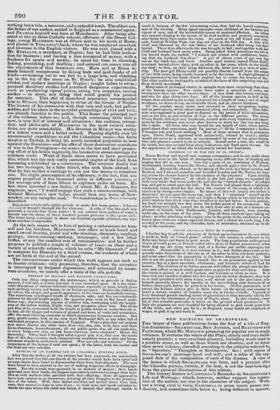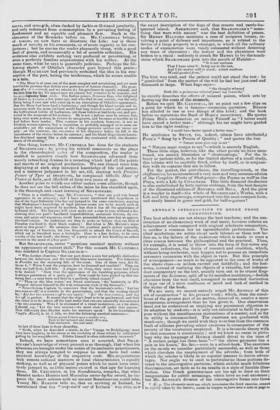NEW EDITIONS OF SHAKSPEARE.
THE larger of these publications forms the first of a trio of Eng- lish dramatists—S HAKSPEARS, BEN JoNsoN, and BEAtnaoxr and FLETCHER, which Mr. MoxoN is preparing for popular use in single volumes. It contains the whole of the Plays, clearly and even hand- somely printed; a very excellent glossary, including words used in a peculiar sense, as well as those which are obsolete, and no fewer than seven indexes, classified according to the subjects referred to, as " Speeches," " Thoughts or Sentiments," &c.; with copies of SHARSPEARE'S marriage-bond and will ; and a table of the sup- posed date of the composition of each of his dramas. A view of the house in which SHAKSPEARE was born, and a portrait after the Chandos picture, (which, if the best, is not the best-looking,) form the pictorial illustrations of this edition. The literary feature is CAMPBELL'S Remarks on SHAKSPEARE s Life and Writings ; which, however, neither support the reputa- tion of the author, nor rise to the character of the subject. With- out a living rival in verse, CAMPBELL in prose rarely passes me- diocrity, and sometimes falls below it; being deficient in marrow, nerve, and strength, often dashed by feeble or ill-timed joeularity, and only redeemed from commonplace by a pervading feeling of bonhommie and an equable and pleasant flow. Such is the character of the Remarks before us. Mr. CAMPBELL brings, of course, no new facts to illustrate the Life; nor is there much of novelty in his comments, or of acute sagacity in his con- jectures ; but he carries the reader pleasantly along, with a good deal of gossip, and occasionally a bit of sensible reflection. His criticism also exhibits nothing very profound or penetrating, or even a perfectly familiar acquaintance with his author. At the same time, what he says is generally judicious. Perhaps the fol- lowing sketch of Othello's character goes beyond this praise; though MACREADY had previously embodied the idea in his con- ception of the part, bating the tenderness, which he seems unable to retain.
4, The Moor is at once one of the most complex and astonishing and }et most intelligible pictures that fiction ever portrayed of human character. His gran- deur of s "I I. natural, and we admire it; his gentleness is equally natural, and we love him for it; his appearance we cannot but conceive to be majestic, and his phyriognomy bens elect. The Indian prince, 'Immo Roy, who delighted all hearts ret London a few years ago, and who died to our sorrow, was the only living being I ever saw who came up to my conception of Othello's appearance. But the Moor had been bred a barbarian ; and though his bland nature and in. tercnurse with the more civilized world had long warred against and conquered the half-natural habits of bat barism, yet those habits at lad broke out, and pre. vailed in the moments of his jealousy. He is not is jealous man by nature, but, being once made jealous, he reverts to savageness, and becomes as terrible as he
bad before been tender. This contrast in his conduct, however, is not an Ovidian metamorphosis, but a transition so probably managed as to seem un- avoidable; yet the naturalness of the change prevents neither our terror nor pity : on the contrary, the sweetness of his character before its fall is the smoothness of the stream before its cataract ; and his bland dispositions hereto. fore displayed appear like a rich autumnal day contrasted with the thunder. storm of its evening."
One thing, however, Mr. CAMPBELL has done for the students of SHAKSPEARE by giving his critical comments on the plays in the chronological order of the composition, the reader is enabled to perceive clearly how SHAKSPEARE advanced from merely retouching dramas to a recasting which had all the points and merits of an original production. We can almost trace him displaying at each step increased knowledge of life and nature, and a matures judgment in his art, till, starting with Pericles Prince of Tyre at twenty-six, he compassed Othello Moor of Venice at forty, and Macbeth at forty-two years of age. Another point to which our editor makes some allusion, though he does not see the full riches of the mine he has stumbled upon, is the thorough and exact learning of SHAKSPEARE.
" There is a tradition," says Mr. CAMPBELL, " that our poet was bound apprentice to an attorney ; and I have never mentioned this hypothesis to one of the legal fraternity who has out jumped to the same conclusion, arguing that Shakapeare's knowledge of legal phrases seems not to be merely such as might have been acquired by accident, but that it has all the appearance of technical skill. Thelawyers will even make out a case to you, without a fee, showing that our poet's barefaced improbabilities, audacious fictions, sly eva- sions, and quips and rogueries, could have proceeded from none but an appren- tice-bred lawyer. Su ambitious are they to make us believe that our bird of Paradise was bred in their black rookery ! But what is Mr. Malone's argu- ment on this point ? He surmises that the youthful poet's ardent curiosity, about the age of fourteen, led him frequently to attend the Court of Record, which sat in Stratford once a fortnight. Here is a fine fiction, to be sure, worthy of the law itself; the forms of a petty court of law kindling an ardent interest in the mind of a boy poet !"
But SHAKSPEARE, never "mentions nautical matters without an appearance of correct skill." For this remark Mr. CAMPBELL was indebted to Captain GLASSCOCK- " Who further observes, ' that our poet draws a nice but palpable distinction between the fishermen and the veritable blue-water mariners. The fishermen in Pericles are the seafaring folk of the coast. One of them says, Act 11. Scene 1, 4, When I saw the porpoise, how he bounced and tumbled ! They say they are half flesh, half fish. A plague on them, they never come but I look to be dashed." ' How true the appearance of the tumbling porpoise, which is always portentous of a gusty gale ! How could he have picked up this sea- faring fact—a man born and bred in a perfectly inland county ?' " Then on the blue water,' may friend continues, ' the boatswain in The Tempest delivers himseif in the true vernacular style of the forecastle.' " Nevertheless, Captain G. conceives that the boatswain's order, ' Let her two courses off,' is a mistake in the punctuation, and that the reading should be, ' Let her two courses—off to sea again.' Let the two courses, and lay her off, is perfect. It means that the ship's head is to be put leeward, and that the vessel is to be drawn off the land under that canvass nautically denominated the two courses.' Were I in command of a vessel to-morrow, on a lee shore, I should say, ' Let the two courses—we must claw-off under that canvas.' How differently does Dryden make his mariners speak ! In his translation of Virgirs JE'neid, b. iii. I. 525, we find the following nautical nonsense- . Where proud retorts opes a readier way, Tack to the larboard and stand off to sea,
Veer starboard. Sea and land.'
he last of these Hues is sheer absurdity.
" Swift, when he described a storm, in the ' Voyage to Brobdignag,' must have been laughing in his sleeve at the credulity of those whom he anticipated gulling by his bee-gibberish. Dibdin himself is often ridiculously incorrect."
Indeed, we have somewhere seen it asserted, that SHAK- SMARR'S knowledge of every pursuit is so thorough, that when his allusions are brought under the notice of its exclusive practitioners, they are always tempted to suppose he must have had some practical knowledge of the respective craft. His acquaintance with remote national manners or local characteristics is equally striking, as well as of physical points which he must have intui- tively jumped to, so little means existed in that age for learning them. Dr. CRICHTON, in his Scandinavia, remarks, that when Hamlet makes Horatio and Marcellus swear by his sword, he im- poses the most solemn oath an ancient Scandinavian could take. /Coung Mr. BARROW tells us, that on arriving at Iceland, he ascertained that the "crop-ear'd cur of Iceland" was even now the exact description of the dogs of that remote and rarely-fre- quented island. ABERNETHY said, that SHARSPEARE'S " some- thing that wars with nature" v. as the best definition of poison. Sir HENRY HALFORD mentions a case of incipient lunacy, in- volving a point of delicacy and importance, as it related to the devise of a large property to a stranger, in which all the ordinary modes of examination were vainly exhausted without detecting any trace of aberration : the lawyer and the physicians were beaten to a stand : suddenly it struck Sir HENRY to try the touch- stone which SHARSPEARE puts into the mouth of Hamlet- " It is not madness
That I have utter'd: bring me to the test,
And 1 the matter will reword; ; which madness
Would gambol front."
The hint was tried, and the patient could not stand the test : he " gambolled " from the matter of the will he had but just read and discussed at large. When logo says- " the thought whereof Doth like a poisonous mineral gnaw my inwards," he exactly describes the effects of mineral poison, which acts by destroying the coats of the stomach. Before we quit Mr. CAMPBELL, let us point out a few slips on a point for which he is famous—erroneous quotation. BYROK has alluded to one or two things of this kind ; and the book before us maintains the Bard of Hope's consistency. He quotes Prince Hal's exclamation on seeing Falstaff as " I better could have spared a better man ; " although his ear might have guided him to the right reading- " I could have better spared a better man."
He attributes to Swirr, (as, indeed, others have attributed,) POPE'S " Song by a Person of Quality ; " and quotes the line 4, Nature must give way to art"
as " Nature must resign to art,"—which is scarcely English.
These little slips, however, like the other points we have men- tioned, are merely blemishes or " shortcomings." For the li- brary or parlour-table, as for the limited shelves of a small study, this volume will be capitally fitted, either by itself, or in conjunc- tion with its comates that are to follow.
For the pocket, the post-chaise, the travelling-trunk, or the chiffonnitlre,let us recommend a very neat and very accurate edition of the Complete Works of Shakspeare—the Poems as welras the Plays, with a Life by CHALMERS. This little diamond duodecimo is also embellished by forty outline etchings, from the best designs of the illustrated editions of Boynitia. and BELL. And the price is a wonder in itself—the whole of SHAKSPEARE'S Works, with a Life and forty engravings, compressed into the most compact form, and neatly bound in green and gold, for half-a-guinea!



























 Previous page
Previous page